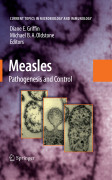
Measles virus, one of the most contagious of all human viruses, has been largely contained by the development and use of a vaccine that was introduced 50 years ago. These two volumes were timed to honor the introduction of the vaccine and to record the enormous advancements made in understanding the molecular and cell biology, pathogenesis, and control of this infectious disease. Where vaccine has been effectively delivered, endemic measles virus transmission hasbeen eliminated. However, difficulties in vaccine delivery, lack of health care support and objection to vaccination in some communities continue to resultin nearly 40 million cases and over 300,000 deaths per year from measles. INDICE: Preface.- Making it to the synapse. Measles virus spread in and among neurons.- Modeling subacute sclerosing panencephalitis in a transgenic mouse system: Uncoding pathogenesis of disease and illuminating components of immune control.- Measles studies in the macaque model.- Ferrets as a model for morbillivirus pathogenesis, complications, and vaccines.- Current animal models.Cotton rat animal model.- Current animal models. Transgenic animal models forthe study of measles pathogenesis.- Molecular epidemiology of measles virus.-Human immunology of measles virus infection.- Measles control and the prospect of eradication.- Measles: Old vaccines, new vaccines.- Measles virus for cancer therapy.- Measles virus induced immunosuppression.- Hostile communication of measles virus with host innate immunity and dendritic cells.- Subject index
- ISBN: 978-3-540-70616-8
- Editorial: Springer
- Encuadernacion: Cartoné
- Páginas: 292
- Fecha Publicación: 01/11/2008
- Nº Volúmenes: 1
- Idioma: Inglés
